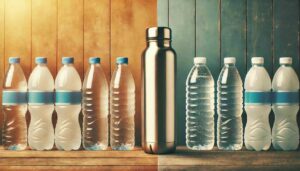Have you ever stopped to think how much plastic you use in a day?
Single-use items have infiltrated every aspect of our modern life, from coffee cups to plastic bottles. They are convenient but come with a hefty environmental, economic, and health-detrimental price.
Together, let’s prove to everyone why ditching disposables is a smart, reachable, sustainable, and rewarding choice.
Our website is reader-supported. We sometimes include products we think are useful for our readers. If you buy through links on this page, we may earn a small commission.
1- Reduce Environmental Pollution

Did you know that over 8 million metric tonnes of plastic enter the oceans every year, poisoning our food supply? And that the world landfilled over 200 million tonnes in 2019 alone?
According to a new study by Portland State University, micro plastics shed from clothing and packaging are reaching the fish people consume at an alarming rate.
If we don’t change our consumption habits, another 33 billion Mt will accumulate by 2050.
Waste sites are overflowing with plastics, solar panels, razors, batteries, clothes, and other products that take centuries to degrade. Take the Puente Hills Landfill in Los Angeles, for instance—it’s a staggering 150 metres high.
The problem is that plastics do not biodegrade. Over time, they break down into smaller particles, reaching the micro- and nanoscale. With such a tiny size, they accumulate in our brains, lungs, the air we breathe, and our cells.
Practical Example
Consider plastic water bottles. Only 9% of them are recycled, even though companies engage in greenwashing to mislead consumers. The remaining 91% ends up in landfills, litters streets, or floats in the ocean.
This is not a made-up story. You see it every day in crammed rubbish bins or scattered on beaches worldwide.
That’s not the worst part, however. Researchers have found tens of thousands of plastic particles in bottled water. Thus, whenever you drink from a PET bottle, you’re ingesting plastics; it causes inflammation, fertility problems, and changes in brain function.
Solution
Invest in renewable alternatives: stainless steel bottles, fabric bags, and glass containers. Not only are they durable but also reduce waste.
Start small: Keep a reusable shopping bag in your car or backpack for grocery trips, or have your own stainless steel straw.
If we all adopt these little changes, we can control pollution in no time.
2- Save Money in the Long Run
You haven’t thought about that, have you? It might seem counterintuitive, but disposable items impact your finances. Look.
Constantly buying single-use products like paper towels or plastic bottles adds up.
Practical Example
Imagine spending £2 on PET bottled water every single day. That’s a whopping £730 a year!
But by switching to a reusable bottle (£15-£30), how much would you save annually? That could fund a holiday.
Solution
Instead of buying paper towels, use washable microfibre cloths for cleaning or swap disposable razors for safety razors.
You will cut down waste and save tonnes of money.
So, isn’t it a good approach?
3- Improve Personal Health

If you have your takeaway food in a styrofoam container, you are harming your body with BPA and phthalates. Those chemicals leach into your meals and might lead to hormone disruption and chronic diseases.
Practical Example
While microwaving in plastic containers is convenient, its excessive use may release cancer-causing substances.
Solution
Switch to a microwavable glass bowl and store food in stainless steel containers. For leftovers, opt for beeswax wrap, which leaves a lighter footprint.
4- Combat Climate Change

Yes, producing single-use items emits huge amounts of greenhouse gases. They need massive quantities of energy and resources from the extraction of raw materials to transport.
This cycle speeds up global warming, believe it or not, and worsens air and water pollution.
Practical Example
The production of one plastic bottle emits around 0.5 pounds of CO2.
Now, multiply that by billions of bottles produced every year, and you’ll have a staggering, impactful figure. We are all breathing that.
Solution
Be a mindful consumer and adopt a minimalistic approach.
To illustrate, ditch disposable coffee cups in favour of a reusable travel mug. Many coffee shops offer discounts when you bring your own cup—a win-win for your wallet and the environment.
Speaking of coffee, do you really need to drink it every day? Did you know that coffee plantations have replaced 2 million hectares of forest worldwide in the last ten years?
Deforestation exacerbates climate change since trees absorb CO2 and regulate the Earth’s temperature.
Woodlands are our planet’s lungs. No trees, no oxygen; no oxygen, no life. Simple as that.
5- Encourage a Circular Economy
Our current “take-make-dispose” model is unsustainable. By cutting down on disposable items, you support a circular economy where resources are reused, recycled, and repurposed.
Almost every single-use product is wasted. No further purpose.
Practical Example
Brands such as Patagonia repair old clothing to extend its life, keeping products out of refuse sites. Other companies, including Nudie Jeans (Sweden), Eileen Fisher (US), Arc’teryx (Canada), MUD Jeans (Netherlands), and Veja (France), also promote sustainable consumer habits by giving free lifetime repairs, trading in, or reselling used garments at lower prices.
Support businesses that prioritise sustainability, like those offering refillable packaging. On top of that, donate or repurpose items you no longer use.
For instance, turn an old T-shirt into a cleaning rag instead of tossing it.
6- Set a Positive Example

Light the way for others and promote an eco-friendly lifestyle; your actions can have a ripple effect.
When you choose to reduce disposables, you inspire friends, family, and even strangers to follow suit. Collective action amplifies the impact and drives meaningful change.
Initiatives such as the global movement “Plastic Free July” have encouraged millions worldwide to ditch disposable items for a month. But it didn’t stop there. Hundreds of thousands still continue with this practice, even after the event is over.
Share your journey on social media. And if you don’t mind, host a workshop on how to make DIY reusables based on your experience, like tote bags from old clothes.
Showing others how easy it can be might spark their interest in sustainability and originality.
Here’s what I did. Twelve years ago, I got an Iron Maiden hoodie, but after intensive wear, I transformed it into the most original grocery bag. Eddie appears at the front and the back, drawing everyone’s attention.
Real-World Examples of Success

Often recognised as the cleanest country in Africa, Rwanda implemented strict bans on plastics in 2008. This policy helped reduce waste and pollution in just a couple of years, benefiting people’s health and the country’s economy. Likewise, in 2017, Kenya prohibited the use, manufacture, and sale of plastic bags.
Other examples include anti-plastic regulations in:
- Bangladesh in 2002 (first in the world)
- Uganda (2007)
- Indonesia and New Zealand (2019)
- China and Thailand (2020)
- European Union (2021)
- India in 2022 (which included cigarette packaging)
- Canada (2023)
These cases prove that cutting down on disposable items is not just possible but also rewarding and impactful on a large scale.
Closing Thoughts
Reducing disposables is a small step; yes, but it can become a mighty march towards a cleaner planet, a more sustainable future, and a healthier wallet.
Like a pebble in the pond causing ripples, our efforts reverberate. Inspire others to support the cause, whether by swapping out plastic bottles for reusable ones or supporting eco-friendly brands.
We hope our post has inspired you to launch a crusade in favour of a pollution-free world. This planet is our home, and it’s up to us to keep it liveable.
Start today by making one little change. Replace plastic bags this week. Next month, ditch bottled water for a stainless steel alternative.
Every effort counts!


